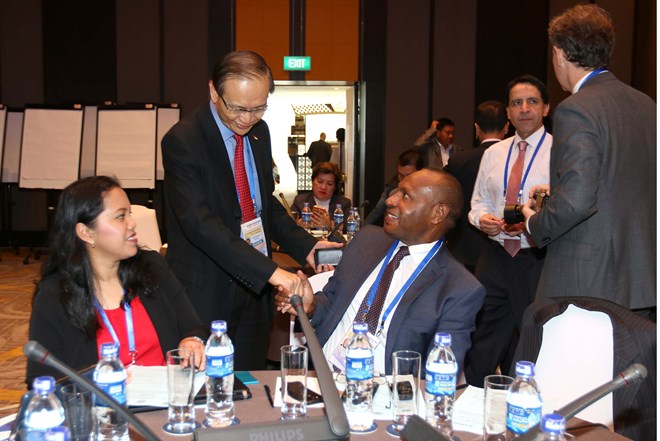Vietnam is working towards becoming a destination for startup businesses in the Asia-Pacific Economic Cooperation (APEC) region.

APEC delegates talk on the sidelines of an APEC meeting in Ho Chi Minh City
The Vietnamese Government has set a target of having one million effective enterprises by 2020.
Adrian Tan, Programme Director of the Vietnam Innovative Startup Accelerator (VIISA), said “The Vietnamese Government has been visionary in setting such an ambitious goal. It certainly has encouraged Vietnamese people to look to creating startups.”
The country’s Ministry of Science and Technology has also been proactive in engaging the startup community and investors about how they can support startups, such as the “The Speedup” programme, he added.
To realise the aforesaid goal, Aslam Perwaiz, head of the Disaster Risk Management System under the Asian Disaster Preparedness Centre, suggested Vietnam focus on its already competitive areas such as garment-textile and rice production as well as other fields which would give a lot of competitiveness.
“I would rather recommend that Vietnam’s government should be investing a lot in information technology, digital transformation, and help small-and medium-sized enterprises access those things”, he said.
Vice President of the Vietnam Chamber of Commerce and Industry (VCCI) Vo Tan Thanh said Vietnam is evaluated as one of the most entrepreneurial countries in the world, adding that the country is engaging very strongly in promoting entrepreneurship nationwide and offering a number of new policies to support startups.
VCCI Secretary General Pham Thi Thu Hang said Vietnam is on its way to become a startup destination since it has a promising market and growing population.
With the spirit of “dare to think, dare to act”, Vietnamese youngsters are definitely capable of creating a startup community in the region despite external competitiveness, she said, referring to the significant role of policy makers in building a dynamic and innovative startup ecosystem.
Established in 1989, APEC comprises 21 economies, including Australia, Brunei, Canada, Chile, China, Hong Kong (China), Indonesia, Japan, the Republic of Korea, Malaysia, Mexico, New Zealand, Papua New Guinea, Peru, the Philippines, Russia, Singapore, Chinese Taipei, Thailand, the US and Vietnam.
HCM City aims to be startup urban centre

A corner of Ho Chi Minh City
Ho Chi Minh City is striving to become Vietnam’s startup urban centre with the establishment of 500,000 enterprises through 2020.
The city has focused on activities to develop a startup ecosystem under a programme which supports small and medium-sized enterprises to enhance competitive capacity and global integration. The programme’s core goal is to encourage innovative startups via scientific research development.
Aslam Perwaiz, Head of Disaster Risk Management System, Asian Disaster Preparedness Centre, described HCM City as the “business capital” of Vietnam. He also lauded the improvement of the city’s public infrastructure service.
An article of the Singapore-based Channel News Asia noted Vietnam’s largest and most progressive city, HCM City is the engine of the country’s growth, at a growth rate of 8.5 percent a year. The city is also viewed as the epicentre of the start-up scene in Vietnam, where most of the country’s 3,000 start-ups operate.
As an effort to realise the target, the Saigon Innovation Hub (SiHub) was inaugurated on August last year, creating a co-working space to support the development of the local startup community.
In addition, HCM City will build an industrial zone for new businesses, including startups, and aid firms with business registration procedures.
The city has drafted specific measures to create favourable conditions for businesses, including simplifying administrative procedures, setting up hotlines to receive feedback from companies and help them resolve their difficulties in a timely manner and developing programmes to provide information about support policies.
In the first five months of 2017, the city had 309,138 businesses, 89.25 percent of them micro small, 4.3 percent small, 5 percent medium-sized and 1.37 percent large.
VNA